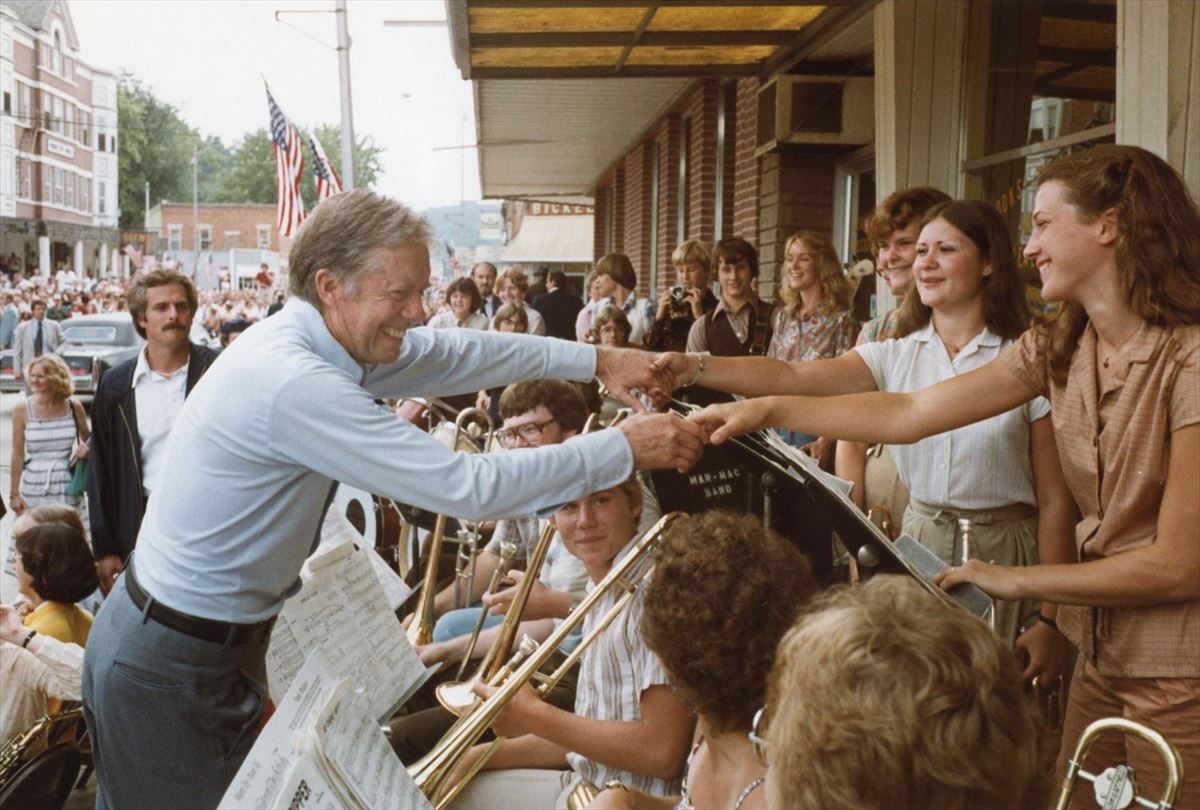The Democratic leader had been in palliative care for two years. Nobel Peace Prize laureate Carter also became involved in the Basque peace process through his foundation and publicly supported the 2011 Aiete Peace Conference.
Former US President Jimmy Carter, elected in 1976 and winner of the Nobel Peace Prize, died on Sunday at the age of 100.
Carter, who He was at home in palliative care.and voted in the last election, had received treatment for an aggressive form of melanoma skin cancer, with tumors that had spread to the liver and brain. The former president had to battle the same disease that defeated his father and three brothers.
His death was confirmed by his son without providing more details, the newspaper said WashingtonPost.
Carter was president from 1977 to 1981 and won the Nobel Peace Prize in 2002for his contribution to conflict resolution in various countries around the world.
The Democratic leader also got involved in the peace process in Euskal Herria through his foundation and gave his public support to the Aiete Peace Conference in 2011.
Legacy in American and world politics
Considered one of the most progressive leaders the United States has ever had, Carter saw his term reduced to four years due to the American hostage crisis in Iran, an episode that deeply wounded the country’s morale and caused the most conservative cause. They will forever label him as a weak leader.
His presidency was marked by the 444 days of captivity in Iran for 52 American hostagesreleased on the same day Carter handed power to Republican Ronald Reagan.
Time put things in place and his presidency was viewed positively, to the point that he won the Nobel Peace Prize in 2002.
“My life after the White House has been the most rewarding for me,” Carter admitted at a press conference in August 2015.
Ambitious, competitive, and with a strong sense of morality, Carter set a new standard for life after the presidency, using his political capital to continue to influence the nation’s public life and create change in the world.
His inseparable wife Rosalynn, to whom he was married for 69 years, remembers Carter waking her up one night in 1982 and telling her, “We have to invent a place like Camp David,” the presidential residence where he negotiated peace. between Israel and Israel. Egypt in 1978.
A few months later the Carter Center, that fights conflict, poverty, disease and hunger in the world.
“What Rosalynn and I wanted to do was fill in the gaps, solve problems that others didn’t want to or couldn’t deal with,” Carter explained in an interview with Rolling Stone magazine in 2011.
His tenure in the White House bore its most important fruits in the field of foreign policy: in addition to negotiating the Egyptian-Israeli peace, Carter resumed relations with China in 1979 and signed the treaties establishing Panama’s sovereignty over the channel recognized.

Biography
Born in 1924 in a town of only 600 people called Plains, Carter grew up on a peanut and cotton farm in the poorest area from the southern state Georgia. His father, Earl, “was a segregationist, just like all the other men in the county,” the former president acknowledged in a July (2015) interview.
The one who influenced his character most was his mother Lillian, a nurse who disdained the racial prejudices of those around her.
In 1946 graduated from Annapolis Naval Academy (Maryland), married Rosalynn and joined the Navy, but returned to Plains in 1953 to take over the family farm.
He preached in a Baptist church. There he strengthened his ties with the Baptist church, where he continued to preach sermons until the end of his life and began to take an interest in politics, until heIn 1962 he won a seat in the Senate.
After a failed first attempt, Carter was chosen as governor of Georgia in 1970after a campaign in which he shook hands with 600,000 people and built the image of a modest and approachable politician who would eventually open the doors of the White House to him.
Carter was little known nationally, but his southern origins, his fair appearance and his radiant smile They fascinated a country disillusioned with traditional politics and eager to regain its self-esteem after the Watergate scandal and the Vietnam War.
On a national level, Carter created the Ministries of Education and Energyfought inflation and reduced dependence on foreign oil, but clashed with the 1979 oil crisis and images of long lines at gas stations.
His favorite president was Harry Truman (1945-1953), who, like him, was deeply unpopular when he left the White House and who today often appears on lists of the best leaders in the United States. Many of his admirers rely on a similar historical claim for Carter.
Source: EITB
I’m Wayne Wickman, a professional journalist and author for Today Times Live. My specialty is covering global news and current events, offering readers a unique perspective on the world’s most pressing issues. I’m passionate about storytelling and helping people stay informed on the goings-on of our planet.



